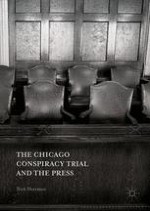2016 | OriginalPaper | Buchkapitel
6. “The Exclusion of Authority”: Ramsey Clark’s Muted Evidence
verfasst von : Nick Sharman
Erschienen in: The Chicago Conspiracy Trial and the Press
Verlag: Palgrave Macmillan US
Aktivieren Sie unsere intelligente Suche, um passende Fachinhalte oder Patente zu finden.
Wählen Sie Textabschnitte aus um mit Künstlicher Intelligenz passenden Patente zu finden. powered by
Markieren Sie Textabschnitte, um KI-gestützt weitere passende Inhalte zu finden. powered by
